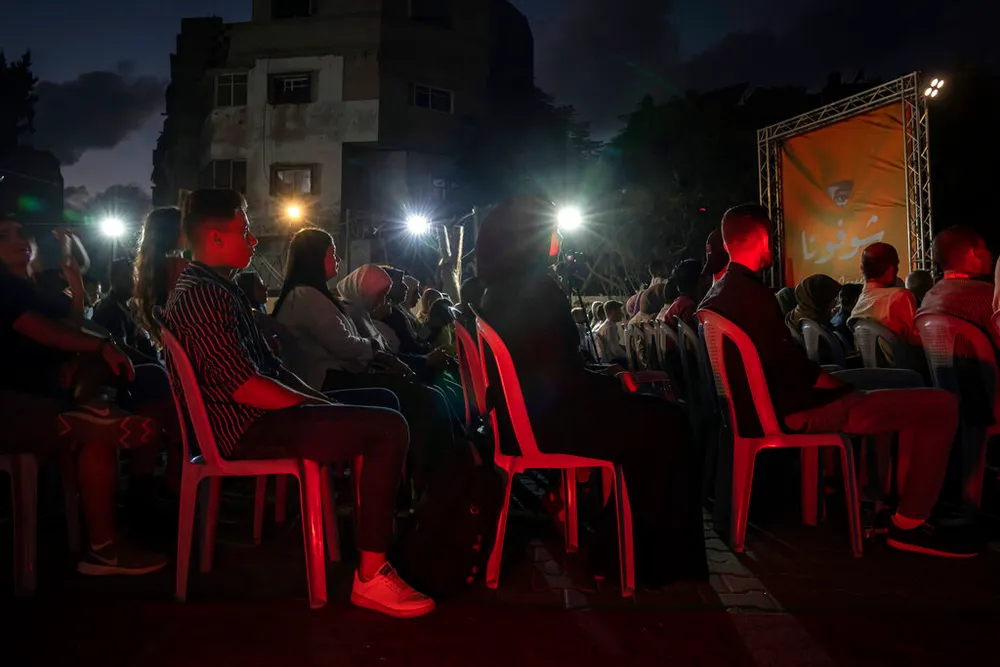‘We are showing people how to fight for their rights without violence’
Movie buffs in the Gaza Strip enjoyed a rare chance to see a slate of films on the big screen as part of the sixth edition of the Red Carpet Human Rights Film Festival, which opened last week.
Cinema once flourished in the Palestinian enclave, with audiences flocking to see Arab, Western, and Asian films. But movie theaters were torched during the First Intifada in 1987 and burned down again in 1996 during another wave of internal violence.
Since then, Gazans have been deprived of the basic yet rapturous experience, relying on television and online streaming services.
The festival’s executive director Montaser al-Sabe, who was born during the First Intifada, recalled being gripped by cinema from an early age, growing up without movie theaters to feed his passion for the art form.
“What kind of country are we heading for without cinema, without art? What kind of life is that?” he urged, talking to i24NEWS as he walked a busy Gaza street after screening the final film of the day.
The chance to see films on the big screen offered a rare treat for people living under an Israeli-Egyptian border blockade, which came in response to Hamas’s takeover of the Strip in 2006.

Al-Sabe and other film enthusiasts work to bring movies to the younger generations of Gazans, to “show them that their lives are not normal.”
Filmmakers in the enclave began holding a Red Carpet Human Rights Film Festival in 2015, initially with screenings in the city of Shuja’iyya, amid the rubble of buildings destroyed during the war with Israel the previous year.
The team of film connoisseurs, led by Palestinian director Khalil al-Mozian, gained approval from Hamas in 2019 to move from the streets to the abandoned Amer Cinema in Gaza City. But authorities ultimately banned the festival from taking place inside the cinema, forcing the organizers to host the event outside once again.
Months later, Covid took away all hopes for a festival in 2020 or 2021.
But this year, al-Sabe and his team were ready, having secured permits and approval from authorities to renovate the Holst Cultural Center in Gaza City and use it for the festival’s sixth installment.

With most of Gaza’s two million residents unable to leave the territory, and the youngest residents having never stepped inside movie theaters, al-Sabe sees cinema as a way of showing Palestinians the world beyond its borders.
“We open this window to our audience to show them another kind of civilization, that our lives are not normal,” he said.
Gaza’s 2022 Red Carpet Human Rights Festival showed 43 films. Around half of the movies dealt with the decades-long conflict with Israel, while the rest focused on human rights issues around the world.
“It’s some kind of revolution. We are fighting for human rights. Not in a violent way, but giving people a chance to speak about their feelings. We are sending a small message to our people: ‘Open your eyes to the ugly reality of Gaza and think about a solution for a better future’,” said al-Sabe.

After the success of the festival’s first edition in 2015, al-Sabe explained how he and his team felt a responsibility to re-create the event “every year until the world’s end,” and that each edition would need a theme to describe how “the people of Gaza feel.”
This year’s slogan – “Shoufona” – encapsulates plenty of meaning, al-Sabe explained.
“We wanted something to explain how we feel. ‘Shoufona’ has a lot of meaning: ‘Look to us,’ ‘we still exist,’ ‘we are hiding under the rubble,’ all relate to that one word.”
Around 300 films from 60 countries were submitted before organizers selected which ones to show this year, including five films by local directors. Some were world premiers, and others were screened for the first time either in the Middle East or in the Palestinian territories.

Opening this year’s festival was a trio collection of animated short films by Palestinian director Ahmed Saleh, whose film “My Second Eye” won the 43rd Student Academy Awards in 2016. Along with the award-winning movie screened were Saleh’s “Night” and “House” films, all of which portray life in Gaza.
“There’s talent in Gaza, and we deserve to show that,” al-Sabe pled.


